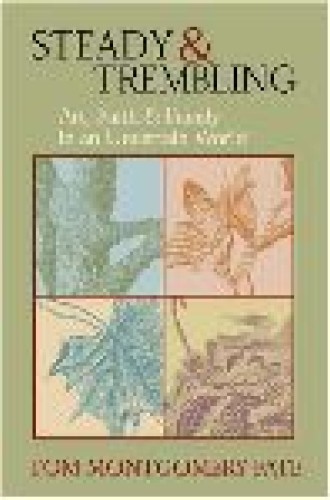Steady and Trembling
Motherhood memoirs are glutting the market these days. Yet beyond how-to manuals for new dads, glossy gift books for Father’s Day, and the occasional memoir of a son about his father, reflective writing by men about parenting is scarce.
Steady and Trembling is a notable exception. Tom Montgomery-Fate sets out to answer the questions: “What does learning how to believe in God have to do with learning how to parent and learning how to write? Can these three arts somehow be woven into an integrated life?” By recounting epiphanies of daily life, he carefully laces together his work as a writer, as a Christian and as a father, discovering again and again that “a family, like faith, is not a problem to be solved, but an experiment in love.”
Montgomery-Fate’s children appear frequently in his essays, usually as reminders of what adults lack: wonder, compassion, absorption in the present rather than worry about the future. Only occasionally does the author explore contradictory feelings about parenthood—dreams of “not being needed, or of being needed a lot less.”
A fourth strand is braided into the essays as well, one that the subtitle doesn’t mention: the natural world. The book is structured around the four seasons, and Montgomery-Fate did most of his writing at a farm purchased by his family and some friends who wanted “less to own a piece of the natural world than to belong to it.” His reflections straddle solitary days of writing at the farm and his life with his family and his teaching job in a Chicago suburb. Montgomery-Fate writes that the movement between the two settings fills him with “confusion, and joy,” and he admirably avoids easy answers to the dilemmas of compartmentalized 21st-century life.
In the essay “Homing,” in which he recounts his frustration with both modern nomadic life and his own frequent moves, Montgomery-Fate resists romanticized definitions of home. He ends the piece with a poignant stop at the Wal-Mart in his Iowa hometown, where he sits in a rocking chair in the home furnishings department and listens to a voice announcing a deal on corn chips. “The store is familiar,” he writes. “As I stumble along, I feel both a bit sad and oddly at home.”
Montgomery-Fate’s search for awareness and for connection to nature and other people in the midst of a fast-paced consumer culture is nothing new. Many authors—most notably Scott Russell Sanders, Annie Dillard and Wendell Berry—have written of it before. If you have read them, Steady and Trembling will feel like a tromp through familiar terrain. Yet walks through recognizable landscapes are often pleasant, and Montgomery-Fate is a likable and honest companion who gently points out the transcendent in the mundane, the political in the personal, and the perfect in the deeply flawed. Although his writing at times lapses into self-conscious drifting—his reflections on writer’s block should have been edited out—he has a keen eye for beauty wrapped within the ordinary: the eye of a dying goldfinch, his daughter’s fall off a bike, some trout lilies in melting snow. “We cannot consider the lilies if we cannot see them or smell them or touch them—if we don’t drop to our knees,” he writes. With austere and lovely prose, Montgomery-Fate invites readers to consider that such attentiveness is perhaps the truest form of prayer.





